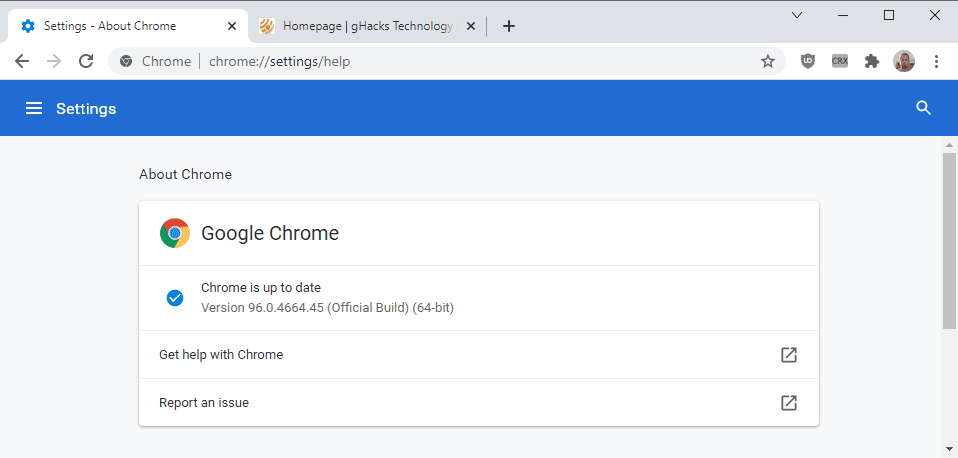Google released Chrome 96 for all supported desktop operating systems and Android this week; the new version is 96.0.4664.45. No mentioning of security updates in the release.
Chrome 96
Google plans to roll out the update to all devices running Chrome in the coming weeks. Desktop users may speed up the process by loading chrome://settings/help in the browser's address bar. The page that opens displays the currently installed version and runs a check for updates. The new version will be picked up and installed automatically. A restart is required to complete the process.
The official blog post on the Chrome Releases blog offers virtually no information on the release. It lists the version number and that the extended stable of Chrome has been promoted to Chrome 96 as well. Google switched to a 4-week release cycle for Chrome recently and created the extended channel to increase the release period to every other release (8-weeks).
A Chrome 96 beta post on the Chromium blog reveals information on what is new in the new version. Here is a list of important changes:
- HTTPS is used to connect to websites if an HTTPS record is available from the domain name service (DNS).
- Web applications may register as URL protocol handlers, e.g. to launch twitter links using the Twitter PWA, or FTP links using a web FTP application.
- New Origin trial: Conditional focus
- Applications that capture other windows or tabs currently have no way to control whether the calling item or the captured item gets focus. (Think of a presentation feature in a video conference app.) Chrome 96 makes this possible with a subclass of MediaStreamTrack called FocusableMediaStreamTrack, which supports a new focus() method.
- New Origin trial: Priority Hints
- Priority Hints introduces a developer-set "importance" attribute to influence the computed priority of a resource. Supported importance values are "auto", "low", and "high". Priority Hints indicate a resource's relative importance to the browser, allowing more control over the order resources are loaded.
- Back forward cache on desktop for faster navigations to "previously-visited pages after cross-site navigations".
- New credentialless policy for Cross-Origin-Embedder-Policy.
- Cross-Origin-Embedder-Policy has a new credentialless option that causes cross-origin no-cors requests to omit credentials (cookies, client certificates, etc.). Similarly to COEP:require-corp, it can enable cross-origin isolation.
- Unique IDs for desktop PWAs.
- The appmanifest spec doesn’t explicitly define what uniquely identifies a PWA. Currently, on the desktop versions of Chromium-based browsers and Firefox on Android, PWAs are uniquely identified by app's start_url and Android Chromium-based browsers use manifest_url instead. This is confusing to developers. Also it made developers unable to change their start_url and manifest_url.Having a stable id allows apps to update other metadata like start_url and manifest_url, and have a consistent way to reference apps across browser platforms, PWA stores and other external entities.This feature tracks the launch process for implementation on the desktop side, as the Android implementation will be done with a different timeline. They will both follow the same specification.
- Enhanced content security policy to improve interoperability with WebAssembly.
- Deprecated: The PaymentRequest API has deprecated the basic card payment method. Will be removed in Chrome 100.
Google is also running a trial to find out if Chrome's version 100 release will cause any issues on the Internet. Site owners and users may test this by enabling the flag chrome://flags/#force-major-version-to-100.
Now You: do you use Google Chrome? Have you updated already?
Thank you for being a Ghacks reader. The post Google Chrome 96 is out: here is what is new appeared first on gHacks Technology News.
https://ift.tt/3CfPKtt
from gHacks Technology News https://ift.tt/3qEFicU



No comments:
Post a Comment